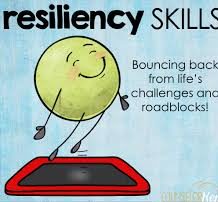
3 Very Effective Simple Resiliency Strategies
Resilience is the ability to overcome adversity. Actually, it’s not simply the ability to overcome adversity it’s the ability to overcome adversity effectively. It’s the ability to navigate through difficulty so as to come out of it as you were or even better. We can overcome adversity in many ways. According to Dr. Lucy Hone, a well-being and resilience expert and associate researcher at AUT University, there are three strategies to help you be more resilient.
1. Knowing that suffering is part of life. According to Dr. Hone, knowing that suffering is part of life staves off a sense of entitlement. It keeps us from asking, “Why me?” Asking why me tends to make us feel worse, by making the person feel alone. Implicit in the question why me is thinking the person suffering is the only one doing so. This idea reminds me of one of the components of self-compassion – common humanity vs. isolation. Knowing that suffering is part of life ties us to the shared human experience. While suffering is grueling, feeling bad for feeling bad makes it even more grueling. Thus, having a keen awareness that suffering is part of the human experience allows us to be resilient.
2. Carefully choosing where you direct your attention. We are the arbiters of where we place our attention. We can choose where we decide to shine our mental spotlight. As I’ve said many times, the negative calls to us, we are hardwired to focus on the negative. Having said that however, we also know that with effort we can focus our attention where we choose. Again, I’m not advocating for closing a blind eye to difficulty, much less feeling its effects. What I am advocating for is being proactive. I’m advocating for choosing what’s best for you and subsequently placing your attention there.
As Dr. Hone says, resilient people have a way of tuning in to the good around them. This is called benefit-finding or hunting the good or focusing on the positive. Benefit finding is defined as experiencing positive outcomes following adverse life events. This means we have to choose to find the good in order to experience those positive outcomes.
3. Ask yourself: “Is what I’m doing helping me or harming me?” What a simple but powerful question! We don’t always act intuitively in our own best interest. Asking yourself this question gives you the ability to act in your own best interest. Asking yourself this question gives you control over your actions. It allows you to respond rather than react. It gives you the opportunity to take a beat and proceed thoughtfully. When we respond to a situation, because we are in control, we tend to feel better about ourselves. Asking yourself if what you are doing is helping you or harming you can be applied to every context. Is what I’m thinking helping me? Is what I’m doing helping me? Is how I’m behaving helping me?
In conclusion, when life gets tough I encourage you to try these strategies. I also encourage you to have realistic expectations about the effects these strategies will have. The only way real change happens is gradually.

 Classes For Schools
Classes For Schools Classes For Companies
Classes For Companies